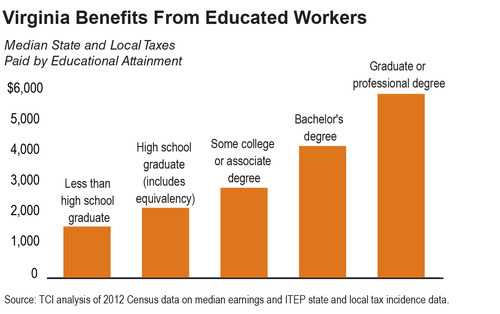January 15, 2014
Opportunity Knocks at Virginia Colleges and Universities
Getting more Virginians to graduate from college – a key to developing a highly skilled workforce and attracting high-paying jobs to the state – is a widely held goal among business, community leaders, and legislators.
One way to make progress is to make sure all Virginians attending in-state public colleges and universities have access to in-state tuition. That may sound obvious, but it’s not the state’s current practice.
Currently, Virginians who qualify to stay and work in the U.S., even though they may have been brought into this country as children by undocumented parents, can’t qualify for in-state tuition.
This is a short-sighted policy, because the economic benefits to the state from an educated workforce are clear, and it costs next to nothing.
Virginians with a bachelor’s degree have median annual earnings of over $52,000 a year, while those with a high school diploma or equivalent earn just $28,000 a year. That’s a difference of almost $25,000 a year.

The higher income means Virginians with a bachelor’s degree also pay more in state income taxes, local property taxes, and sales taxes. State and local taxes paid by a person earning about $52,000/year – the median earnings for someone with a bachelor’s degree – are roughly $4,300/year. That’s over $2,000 more than the state and local taxes paid by a person earning the median for a high school graduate.
Moreover, making this change would have “little or no fiscal impact” on the state, according to official estimates prepared for similar proposals during the 2013 legislative session.
A number of bills before Virginia’s General Assembly (HB59, HB88, HB747, and SB249) would fix this problem and allow in-state tuition for the small number of Virginia students approved to stay and work in the U.S. under federal rules. One of them, SB249, is coming up for a hearing tomorrow in the higher education subcommittee of Senate Education and Health.
Immigrants in Virginia already make significant contributions to the state’s economy. Removing barriers to higher education would help a small subset of Virginia’s immigrants reach their full economic potential. And we all benefit when that happens.
–Laura Goren, Policy Analyst
